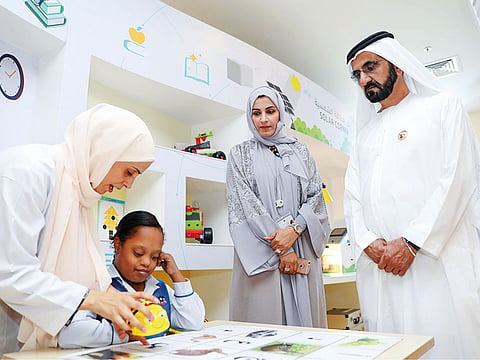Mohammad launches national special needs policy
This segment of people will be called ‘determined ones’ from now, Shaikh Mohammad declares

Dubai: A national policy for empowering people with special needs was launched on Tuesday by His Highness Shaikh Mohammad Bin Rashid Al Maktoum, Vice-President and Prime Minister of the UAE and Ruler of Dubai.
Shaikh Mohammad also announced that people belonging to this segment will no longer be called people with special needs, but rather “the determined ones”. Shaikh Mohammad ordered assigning an official at every institution and body that will be responsible for facilitating and approving services for people with special needs. The official’s title will be ‘the service officer for the determined ones’.
The Vice-President also ordered the setting up of an advisory council for the inspirational ones, which will consist of members of society who will provide their advice and opinion for achieving the goals of the national policy and empowering the determined ones.
Shaikh Mohammad made these announcements during a presentation on the policy organised by the Ministry of Community Development.
Shaikh Mohammad said: “Impeding a human being means that they will never progress or move forward, and they will be unable to achieve anything. What the determined ones have achieved in different fields over the course of previous years is proof that determination and willpower help us achieve the impossible and firmly overcome any circumstances or challenges to reach our goals.
“Today we reviewed the strategy for the community development sector, which includes optimistic future approaches by comprehensively developing all members and segments of the community. We have also launched the national policy for empowering people with special needs, who will now be named ‘determined ones’ due to their tremendous efforts in overcoming all challenges,” he added.
“Today, our institutions will embody our great and consolidated interest in this segment, with an official being appointed for facilitating services rendered to the determined ones. Moreover, an advisory council that includes federal and local government institutions and individuals will offer advice for continuously developing services and finding solutions in record time for issues facing this segment of society,” said Shaikh Mohammad.
Mohammad Bin Abdullah Al Gergawi, Minister of Cabinet Affairs and the Future, and Najla Mohammad Al Awar, Minister of Community Development, were present.
The national policy is based on empowering the determined ones through a number of different themes.
Health and rehabilitation
This theme focuses on providing comprehensive high-quality health care that will contribute to expanding health-care programmes and services provided for all segments. Development surveys will become obligatory, along with developing post-accident rehabilitation programmes and health programmes for the elderly.
This theme also covers providing medical examinations before and during pregnancy and after birth to prevent disabilities. It envisages developing health programmes for the elderly with special needs, as well as developing special health programmes for them. It offers accurate and high-quality diagnosis for people with special needs, and investing in research and studies on disabilities, hereditary and rare diseases that cause disabilities.
The policy involves the launch of a national programme for early detection and diagnosis of impairments. This will include conducting medical tests for newborns and pre-marriage medical check-ups.
Education
This theme is based on two main pillars: Developing an integrative education system in public and vocational education, and redrafting and adapting school curricula to cater to the needs of this segment.
The first pillar will revolve around setting up resource rooms to support technologies and learning materials for this segment, and providing behavioural therapy and therapeutic services for people with speech impediments.
The second pillar will involve providing highly qualified teachers and specialists in teaching people with special needs, and introducing undergraduate degree programmes at universities on teaching autistic children and individuals with severe impairments.
Vocational rehabilitation and employment
This aspect of the policy will contribute to providing vocational rehabilitation programmes designed specifically for people with special needs, and meeting the demands of the job market.
Vocational programmes for people with special needs will be introduced in collaboration with government and private bodies. This will help draft supportive policies to recruit people with special needs in government and private institutions, in addition to setting up a database to offer accurate information about special needs people seeking vocational training and employment.
Outreach
This theme underlines the necessity of offering unified criteria for buildings that take into consideration the needs of people with disabilities to ensure that they enter and exit buildings in an easy and comfortable manner. This theme will also allow them easy access to various information that match their capabilities.
Social protection and family empowerment
It is based on providing social security policies for this segment by adopting a unified classification that will ensure that federal and local special needs legislations are in harmony with the Convention on the Rights of Persons with Disabilities. The theme will ensure that the rights of persons with disabilities are not violated, and will protect this segment from exploitation and abuse by setting up a hotline to receive any complaints from disabled individuals.
Public life, culture and sports
This theme is about ensuring the integration of persons with disabilities into various cultural, sports and social activities, and organising competitions involving this segment in different cultural, social and sports fields. It also involves the launch of awareness raising programmes targeting all community segments.



